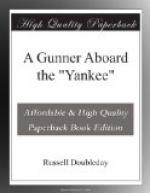Besides the above systems, signalling in the navy includes various other devices. For instance, the fog whistle can be utilized in connection with the Meyer system of numerals. One toot represents 1, two short toots 2, and a long blast the end of a word. In a fog, this is the only means practicable. Similar sounds can be made by horn or gunfire. At night searchlights are often used by waving the beam from the right to the left, thus forming an electric wigwag, or by flash like the heliograph. On small ships not fitted up with the Ardois system, the Very night signal is used. This consists of a pistol made for the purpose, which discharges lights similar to those found in the ordinary Roman candles. The colors are red and green, and they are fired in combinations expressing the numbers from 1 to 9 and 0, so that the numbers to four digits contained in the signal book may be displayed.
The “Yankee” was rigged with the Ardois lamps, and she also carried all the necessary signal flags and other paraphernalia required to communicate with other vessels of the fleet. The signalmen on board had been drilled in their work as members of the Naval Reserve prior to the beginning of the war, and they were experts to a man.
On the evening of June 8th, while we were idling about decks awaiting the order to get under way, a small boat came alongside, having as a passenger a captain of the army. He proved to be a special agent who had succeeded in visiting the vicinity of Santiago, and was on his way to Mole St. Nicholas for the purpose of cabling to Washington. The mysterious manner in which he boarded the ship, and the quickness with which we steamed from port, created some excitement, and we felt the importance of our mission.
The night was dark and muggy—an ideal time for torpedo-boat work, and extra lookouts were posted by order of the captain. Nothing of interest occurred, however, until early next morning. The ship was ploughing along at a steady gait, and those of the watch who were not on actual duty were snatching what sleep they could in out-of-the-way corners, when suddenly the call to “general quarters” was sounded. Long practice caused prompt obedience, and the various guns’ crews were soon ready for action.
Very few of us knew just what was on foot until the “Kid,” in passing, contrived to convey the interesting information that a big Spanish fleet had been sighted dead ahead.
“That’s funny,” remarked “Stump,” trying to peer from the port. “We are not changing our course any. Surely the ‘old man’ doesn’t intend to tackle them alone.”
“I guess the ‘Kid’ is ‘stringing’ us,” observed Tommy, sagely. “He’s up to that trick every time. We’re not chasing Spanish fleets alone. The captain knows his business all right, all right.”
Word was brought from the upper deck presently, that we were in pursuit of a strange steamer which had been discovered lurking on the horizon. She failed to respond to our signals, and chase was made forthwith. The “Yankee’s” speed soon proved superior to that of the stranger, and within an hour we had her close aboard.




